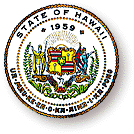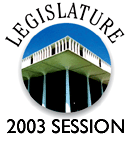
Budget cuts are The state Legislature is preparing a "seriously out-of-balance" budget, according to Gov. Linda Lingle, who vowed to cut it herself.
certain, gov says
Lingle says she'll wield the
» Bill creates flying fee
ax herself if the Legislature
can't make tough choices
» Ethics law watered down, official saysBy Richard Borreca
rborreca@starbulletin.comLingle wants the Legislature to approve changes to Act 211, the high-technology tax credit law that will reduce the law's generous benefits and save the state an estimated $55 million over the next two years.
Without those changes, Lingle said, the budget will not balance, but she will not call the Legislature into a special session to redraft the $3.7 billion budget.
"We will manage the budget. What it means is that I will be substituting my individual judgment for that of the Legislature because they failed to make the tough calls," Lingle said in a speech yesterday to the Hawaii Economic Association at the Hilton Hawaiian Village.
Legislature Directory
Legislature Bills & Hawaii Revised Statutes
"I will take it and make the hard decisions, but I think they are abdicating their own responsibility," she said. "They are just throwing it up (to me) and saying, 'Here, you decide.'"
Sen. Sam Slom (R, Diamond Head-Hawaii Kai) noted that as Lingle has the "ultimate weapon," she can line-item veto parts of the budget and restrict funds.
"She will have a balanced budget, and she has the tools and will to do it," Slom predicted.
House Speaker Calvin Say said he strongly disagreed with Lingle. The House calculations show the budget will balance without changes to Act 221, Say said.
The House will not approve Lingle's request for other tax credits -- which will save money -- and will cut her construction budget to $340 million from $540 million to save on bond interest payments, Say said.
"She is under the assumption that all of her tax credits are going to be adopted and there is going to be $540 million in the CIP. I feel very comfortable that we have a balanced budget," Say said.
Businesses have used Act 221 to write off regular business expenses without making any new high-tech investments or creating any new jobs, Lingle charges.
Budget discussions have been complicated because Say has refused to appoint members to a conference committee on Act 221 changes because he says the House majority Democrats do not want to change the bill.
Democrats in the Senate, however, agree with Lingle that the high-tech tax credit bill is too generous, and want to change it but cannot schedule a meeting with the House to discuss it.
"We have put out bills that would balance the budget, but they are very controversial," Senate President Robert Bunda (D, Wahiawa) said, referring to the tax credit and failed plan to raise the general excise tax.
"I was hoping with the bills they would at least be open to discussion, but we can't get to that point," Bunda said.
He declined to criticize the House action, saying it was "their prerogative" not to negotiate.
Lingle said the House is "taking a political position."
"They will hand me a budget document they know is not balanced, and I will have to make the cuts rather than coming together and work out a budget," Lingle said.
Say said the House calculates the budget is balanced without changes to Act 221.
He added that during the race for governor last year, Lingle had campaigned on her support for the act.
"She went back on her word; she supported Act 221 in its present form. I am not going to switch my position just because she wants to balance the budget on Act 221," Say said.
Lingle also ticked off a list of bills that the Legislature is readying for approval that she does not like.
While stopping short of promising vetoes, Lingle said she did not like bills that would change the civil service reforms enacted two years ago.
The bill would restore the Hawaii Government Employees Association's ability to have pay raises granted through mandatory binding arbitration rather than through bargaining with the power to go on a strike. The changes would also make it harder for the state to privatize state jobs.
Another bill, which would allow workers to use sick leave for family leave, drew a critical review from Lingle.
"It is one of those feel-good bills that will allow them to say the governor is against families," Lingle said.
"The biggest bank in the state (First Hawaiian) and Goodwill Industries have requested a veto, also Shriners Hospital and even Hawaiian Host Chocolate," Lingle said.
"Hawaiian Host estimates that their health care costs will go up 30 to 50 percent," Lingle said.
Say (D, Palolo) defended the measure, explaining that it was similar to employees who now take sick leave to attend a family emergency or take care of a sick parent or child.
"We are just expanding maternity leave to make it a family leave," Say said.
BACK TO TOP |
Leaving the state could soon cost you a little more. House bill would
charge those flying out
of Hawaii about $4By Pat Omandam
pomandam@starbulletin.comDeparting passengers could see between a $3.50 and $4 fee tacked onto the price of an airline ticket, under a conference draft of a bill moving in the state Legislature.
Another measure nearing approval covers traffic code rules for the Segway personal transportation device. Most other bills, however, remained locked in conference committee yesterday until next week, with many tied to a decision on the state budget.
House and Senate conferees tentatively agreed yesterday to create a special state fund in House Bill 1230, CD1, to allow the state Department of Transportation to collect a passenger facility charge that lawmakers say could generate up to $15 million annually for state airport improvement projects.
The Lingle administration has supported the fee. The governor already has the power to impose the charge but needs the Legislature to create a special fund for it.
"We're going to probably agree to this," House Transportation Chairman Joe Souki (D, Wailuku) said yesterday of the Senate's version of the bill, which also includes more funding for security at state airports and harbors.
The conferees will vote on the conference draft on Tuesday.
Currently, 48 states have a passenger facility charge, but Hawaii has not collected the fee for fear it would drive up prices on interisland tickets. The federal government has allowed the states to charge the fee since 1991.
Lawmakers said 330 of the 429 commercial airports in the United States collect the fee, and of the top 100 airports in the country, only 15 do not, and five of those airports are in Hawaii.
House Bill 1230, CD1, would take effect July 1, if approved. Lawmakers passed a similar bill last year, but then-Gov. Ben Cayetano vetoed the measure because it also granted permanent rent relief to airport concessionaires seeking further state assistance following the Sept. 11, 2001, terrorist attacks.
Also yesterday, conferees reached a tentative agreement, which they will vote on Tuesday, that creates state traffic code rules for the Segway Human Transporter, a two-wheeled electric personal mobility device that Sen. Cal Kawamoto (D, Waipahu) sees as an extension of the wheelchair.
This is the third year the manufacturer of the Segway has lobbied the Legislature to create rules for the device, and Kawamoto became an advocate for the bill's passage this session.
"It gives us old guys the freedom to move about, that's all it is," Kawamoto said yesterday. "This is an opportunity for us to do that."
The measure, Senate Bill 1051, CD1, allows the Segway to be operated on sidewalks at no greater that 8 mph, and on bike paths if a sidewalk does not exist or is under repair.
Other traffic rules require the operator to be at least 16 years old and give an audible signal when approaching pedestrians, who have the right of way. Also, a headlamp is needed at night.
BACK TO TOP |
State Ethics Commission Executive Director Dan Mollway says a bill amended by the House Judiciary Committee last month would "water down" the state ethics law and "virtually eliminate almost all conflicts of interests" for state employees and officials. Ethics law is watered
down, Mollway claimsBy Craig Gima
cgima@starbulletin.comMollway says no public hearings were held on the amendments, which he called a "gross abuse of the legislative process."
Chairman Eric Hamakawa and Vice Chairman Blake Oshiro disagreed with Mollway's interpretation of Senate Bill 199, SD1, HD1, and said they believe the amendments do not make major changes to the current law.
They said the amendments were presented in public hearings when House bills with the amendments were sent to the Senate in February, and even if no public hearing was held specifically on the amendments, Mollway could have expressed his concerns to them and other lawmakers at any time during the session.
"It was an open process," Hamakawa (D, Hilo-Glenwood) said.
Oshiro said the main amendment Mollway objects to simply defines the phrase "substantial financial interest," which is in current ethics law.
But Mollway says defining "substantial financial interest" in conflict-of-interest situations as having a "material financial effect" eliminates many of the cases before the Ethics Commission.
For example, Mollway said, a member of a state board who works for a company with business before the board would now be able to vote on matters concerning the company because it cannot be shown that the board member would get a raise or see a "material financial effect" from the vote.
"Merely having a financial interest raises questions in the public's mind as to whether you can be impartial," Mollway said.
In a letter to House Speaker Calvin Say and Senate President Robert Bunda, Mollway urged the bill be killed, and said that under the proposed definition, "no state official or employee, in accordance with this new standard, will ever find himself or herself to have a conflict of interest, except in the most rarest of situations."
Oshiro (D, Aiea-Halawa) said the definition was based on California ethics law, which he said has worked well there.
Sen. Cal Kawamoto, who heads the Senate conferees assigned to meet with the House on the bill, said he does not yet have a position on Mollway's concerns.

